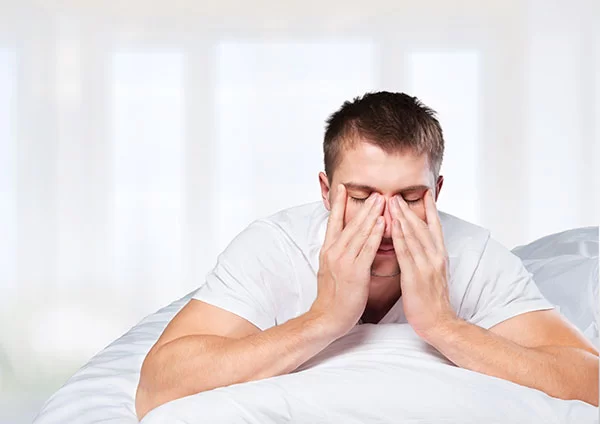Restoring Sleep, Restoring Health
Sleep apnea is a prevalent sleep disorder that disrupts breathing during sleep, impacting millions of people globally. If you wake up feeling fatigued or unrested, sleep apnea could be the cause. Fortunately, there are effective treatment options available to help you regain restful sleep. At Fishinger Dental in Hilliard, OH, we provide advanced sleep apnea treatment options designed to improve both your sleep quality and overall health.
If you suspect sleep apnea, seeking professional care is crucial. Schedule an appointment today with Dr. Nathan Desai by calling (614) 771-6060.

What Is Sleep Apnea?
Sleep apnea occurs when breathing is interrupted during sleep due to airway blockage or improper signaling from the brain. These interruptions can last from a few seconds to minutes, often causing repeated awakenings that prevent restorative sleep.
There are three types of sleep apnea:
- Obstructive Sleep Apnea (OSA): The most common type, OSA happens when throat muscles relax excessively, blocking the airway.
- Central Sleep Apnea (CSA): CSA is less common and occurs when the brain fails to send proper signals to the muscles that control breathing.
- Complex Sleep Apnea Syndrome (CSAS): Also called treatment-emergent CSA, this is a combination of both OSA and CSA.
Signs and Symptoms of Sleep Apnea
Common symptoms of sleep apnea include:
- Loud, persistent snoring
- Breathing pauses during sleep (observed by a bed partner)
- Excessive daytime sleepiness or fatigue
- Morning headaches
- Difficulty focusing
- Irritability or mood changes
- Nocturia (frequent nighttime urination)
- Waking up with a dry mouth or sore throat
If you’re experiencing any of these symptoms or believe you have sleep apnea, contact our Hilliard dental office today to set up your consultation.
Sleep Apnea Risk Factors
Certain factors may increase your risk of developing sleep apnea, including:
- Age and Gender: Sleep apnea is more prevalent in men, but women’s risk increases post-menopause. The condition can also affect children and adolescents.
- Family History: A family history of sleep apnea may increase the risk.
- Weight: Excess weight is a primary risk factor, as fatty tissue can obstruct the airway.
- Alcohol and Sedatives: These substances relax throat muscles, increasing airway collapse during sleep.
- Smoking: Smoking increases inflammation and fluid retention in the airway.
- Nasal Congestion: Chronic nasal congestion, often due to allergies, may lead to difficulty breathing, heightening sleep apnea risk.
- Neck Size: A larger neck circumference can narrow the airway, contributing to OSA.
- Hormones: Hormonal changes, such as those occurring during pregnancy or polycystic ovary syndrome (PCOS), can increase the risk of sleep apnea.
Diagnosis of Sleep Apnea
To diagnose sleep apnea, the following steps are typically involved:
- Comprehensive Examination: Dr. Desai will evaluate your throat, mouth, and neck for structural issues like enlarged tonsils or a narrow airway. If sleep apnea is suspected, you may be referred for a sleep study.
- Sleep Study (Polysomnography): This test monitors your sleep patterns, oxygen levels, heart rate, and breathing to identify sleep disorders like sleep apnea. It can be done in a sleep center or at home with portable monitoring devices.
- Diagnosis and Treatment Plan: If diagnosed with sleep apnea, you’ll return to our Hilliard office to receive a custom treatment plan tailored to your needs.
Consequences of Leaving Sleep Apnea Untreated
Leaving sleep apnea untreated can lead to serious health issues beyond poor sleep. Here are some potential risks:
- Heart Problems: Sleep apnea increases the risk of high blood pressure, heart disease, irregular heartbeats, and stroke due to repeated drops in oxygen levels during sleep.
- Daytime Fatigue: Interrupted sleep can cause chronic daytime drowsiness, affecting focus and increasing the risk of accidents, especially while driving.
- Diabetes: Untreated sleep apnea can lead to insulin resistance, raising the risk of type 2 diabetes.
- Weight Gain: Poor sleep disrupts hunger-regulating hormones, making weight loss difficult and contributing to weight gain, which can worsen sleep apnea.
- Mental Health: Sleep apnea is linked to depression, anxiety, and mood swings due to the lack of restorative sleep.
- Weakened Immune System: Interrupted sleep reduces immune function, making you more susceptible to infections and slowing recovery from illness.
Addressing sleep apnea is vital for maintaining both your health and quality of life. Reach out to Dr. Desai at Fishinger Dental for a diagnosis and personalized treatment.
Sleep Apnea Treatments
There are various types of sleep apnea treatments available. We’ll go over your options and discuss which will be best suited to treat sleep apnea and meet your needs.
CPAP Therapy
Continuous Positive Airway Pressure (CPAP) therapy is the gold standard for moderate to severe sleep apnea. A CPAP machine provides constant air pressure through a mask, keeping your airway open throughout the night.
Oral Appliance Therapy
For those who can’t tolerate CPAP, Dr. Desai offers custom-fitted oral appliances. These devices reposition your jaw and tongue to prevent airway obstruction and are a comfortable, effective alternative to CPAP for mild to moderate OSA.
Lifestyle Modifications
Certain lifestyle changes can help alleviate sleep apnea symptoms. These may include losing weight, engaging in regular physical activity, avoiding alcohol and sedatives, and adjusting your sleep position (e.g., sleeping on your side) can significantly reduce sleep apnea symptoms.
Mouth and Throat Exercises
For mild cases of OSA, mouth and throat exercises can complement other sleep apnea treatments. These exercises are designed to strengthen the muscles in the mouth and throat and can help keep the airway open during sleep. While not typically a standalone solution for moderate or severe cases, they can enhance other treatments.
Surgical Interventions
In some cases, surgery may be necessary to address anatomical issues contributing to sleep apnea. These surgical options include uvulopalatopharyngoplasty (UPPP), genioglossus advancement, or mandibular advancement surgery, which aims to widen the airway.
Frequently Asked Questions
Can sleep apnea go undiagnosed?
Yes, many people live with undiagnosed sleep apnea because they associate their symptoms, such as fatigue or snoring, with other conditions. A proper diagnosis is crucial for addressing the root cause of these issues.
Can children develop sleep apnea?
Yes, pediatric sleep apnea is often related to enlarged tonsils or adenoids. Symptoms include restless sleep, snoring, bedwetting, and behavioral issues during the day.
Are there any natural remedies for sleep apnea?
While lifestyle changes can reduce the severity of symptoms, they are typically not a replacement for professional treatment. Maintaining a healthy weight, exercising, and improving sleep hygiene can support overall well-being and sleep quality.
Your Path to Better Sleep Begins Here – Book Your Appointment
Don’t let sleep apnea control your nights—or your days. At Fishinger Dental, we offer effective sleep apnea treatments to restore restful sleep and improve your quality of life. Call (614) 771-6060 today to book an appointment with Dr. Desai and start your journey toward better health.
We serve patients from Hilliard, Columbus, Dublin, Upper Arlington, Grove City, Westerville, and surrounding Ohio communities.







